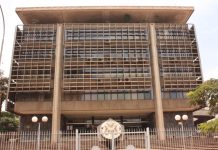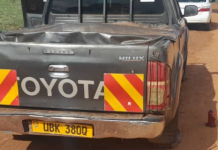By David Mwanje
The Ministry of Works and Transport is slamming the brakes on unauthorized car bonds cluttering the Nakawa-Banda-Kireka stretch of the Kampala-Jinja Highway. In a bold move to restore order to one of Uganda’s busiest trade arteries, the Ministry has announced a sweeping operation to evict car dealers and car bond operators encroaching on the road reserve, signaling a new era of safety and efficiency for commuters and traders alike.
Permanent Secretary Bageya Waiswa didn’t hold back, pointing out the havoc caused by these roadside setups. “The establishment of car bonds within the designated road reserve violates Section 16(1) of the Roads Act, 2019,” Waiswa stated. “They’ve choked traffic, clogged drainage systems, and turned this critical corridor into a safety nightmare for road users.” The result? Gridlock that frustrates drivers, flooded roads during rains, and accidents waiting to happen on a highway vital to Uganda’s economic pulse.
Starting June 27, 2025, the Ministry is giving affected operators a 30-day grace period to pack up and clear out voluntarily. Those who don’t comply face eviction, with unauthorized structures dismantled at their own expense, as empowered by Section 24(1) of the Roads Act, 2019. “This operation is non-negotiable,” Waiswa emphasized. “We’re restoring the functionality, safety, and integrity of this national road network for all Ugandans.”
The Kampala-Jinja Highway, a lifeline connecting the capital to eastern Uganda and beyond, has long been a hotspot for car dealers displaying vehicles in makeshift lots along the road reserve. While these setups have been a boon for some businesses, they’ve come at a steep cost: narrowed roads, blocked drainage channels, and increased risks for motorists and pedestrians. The Ministry’s crackdown aims to reclaim the reserve for its intended purpose—ensuring free-flowing traffic and safe passage.
This move dovetails with the government’s broader vision for infrastructure-led growth, as outlined in the 2025/26 budget. Finance Minister Matia Kasaija recently underscored the importance of such efforts, stating, “Our investments in roads will drive economic progress and ensure safety for all Ugandans.” By clearing encroachments, the Ministry is not just decongesting a highway but paving the way for smoother trade and safer journeys, boosting the region’s economic prospects.
Local commuters and traders are already buzzing with anticipation. “This highway is our lifeline,” said Sarah Namutebi, a trader who shuttles goods between Kampala and Jinja. “Clearing these car bonds means faster trips and fewer headaches.” The Ministry is calling on all affected operators to act swiftly and comply, urging them to be part of the solution rather than the problem.
As Uganda accelerates toward a future of modernized infrastructure, the Ministry of Works and Transport is steering the nation in the right direction. The Nakawa-Banda-Kireka cleanup is more than an eviction—it’s a commitment to safer roads, thriving commerce, and a stronger Uganda. The clock is ticking, and the highway’s revival is just 30 days away.























